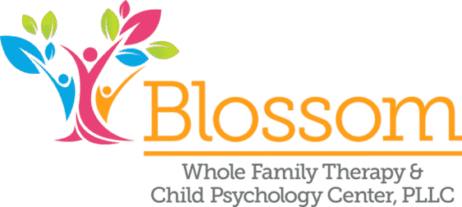Visit our contact page for answers to common questions about insurance and our intake process.
Child Counseling | Blossom Whole Family Therapy
Ready to Start Your Child's Counseling Journey?
Why Families Choose Blossom
🌿 Licensed, compassionate therapists who specialize in working with children and families
🧠 A personalized therapeutic approach for every child
💡 Evidence-based strategies blended with warmth and creativity
💬 Ongoing parent collaboration to support growth at home
🎨 A peaceful, playful space where children feel safe and empowered
What Kids Learn in Therapy
Counseling doesn’t just focus on what’s “going wrong.” It helps children develop emotional skills that support resilience, confidence, and better relationships—skills that often carry into every area of life:
- Emotional awareness – Naming feelings instead of acting them out
- Coping skills – Using tools to calm their body and brain
- Perspective-taking – Understanding others’ feelings and needs
- Planning & follow-through – Strengthening time and task management
- Assertive communication – Asking for help and setting boundaries
Ready to Start?
If your family is looking for child counseling for anxiety and ADHD, or your child is struggling with emotional regulation or behavior challenges, we’re here to help. We proudly serve families in Minnetonka, Wayzata, Eden Prairie, and the greater Minneapolis West Metro.
👩⚕️ Meet Our Team of Therapists and Child Psychologists
You don’t have to navigate this alone. Let’s support your child—together.

Supporting Children’s Emotional Health in the West Metro
Children and teens today face more stress than ever—social pressures, academic challenges, emotional ups and downs, and more. At Blossom Whole Family Therapy, we support children’s mental health with personalized, evidence-based care. We offer child counseling for anxiety, ADHD, emotional regulation, and behavior concerns—helping kids and families thrive with confidence and support.
When to Seek Support
Every child is unique, but these concerns often bring families through our doors:
- Persistent worry, fear, or difficulty separating from caregivers
- Trouble focusing, staying organized, or managing frustration
- Low mood, irritability, or withdrawal from activities
- Emotional outbursts or defiant behavior
- Struggles with friendships or social cues
- Parent-child power struggles
- Difficulty sleeping, or stress around school performance
The CDC emphasizes the value of early mental health support for kids and teens.
 How Child Counseling for Anxiety and ADHD Works
How Child Counseling for Anxiety and ADHD Works
Each therapy plan is tailored to the child’s age, strengths, personality, and needs. Our therapists blend structure and creativity to meet kids where they are—and help them grow.
We use a range of therapeutic approaches, including:
- Cognitive Behavioral Therapy (CBT): Teaching kids to spot unhelpful thoughts and develop coping strategies
- Acceptance and Commitment Therapy (ACT): Helping children build psychological flexibility and connect with their values
- Dialectical Behavior Therapy (DBT): Supporting emotional regulation and interpersonal effectiveness
- Play-Based Therapy: Helping younger children explore emotions through play
- Eye Movement Desensitization and Reprocessing (EMDR): A trauma-informed approach to help children process difficult memories
- Creative Expression: Incorporating art, storytelling, and imaginative play to support emotional healing and self-understanding
- Parent Coaching: Supporting caregivers with strategies that work at home
- Mindfulness & Self-Regulation: Building tools to manage stress and big feelings
For families seeking more background, Child Mind Institute offers helpful overviews of common child mental health concerns.
 Common Myths About Child Therapy
Common Myths About Child Therapy
Even parents who value mental health support sometimes hesitate. Let’s clear up a few common misconceptions:
- "My child is too young for therapy."
Even preschoolers can benefit from developmentally appropriate interventions. - "If I were parenting better, we wouldn’t need therapy."
Therapy is a sign of proactive care—not failure. You're showing up for your child’s long-term wellbeing. - "Therapy means something is seriously wrong."
Not at all. Therapy helps with everyday challenges just as much as clinical concerns. - "My child won’t talk to a therapist."
That’s okay. Many children express themselves through play, movement, drawing, or storytelling.










